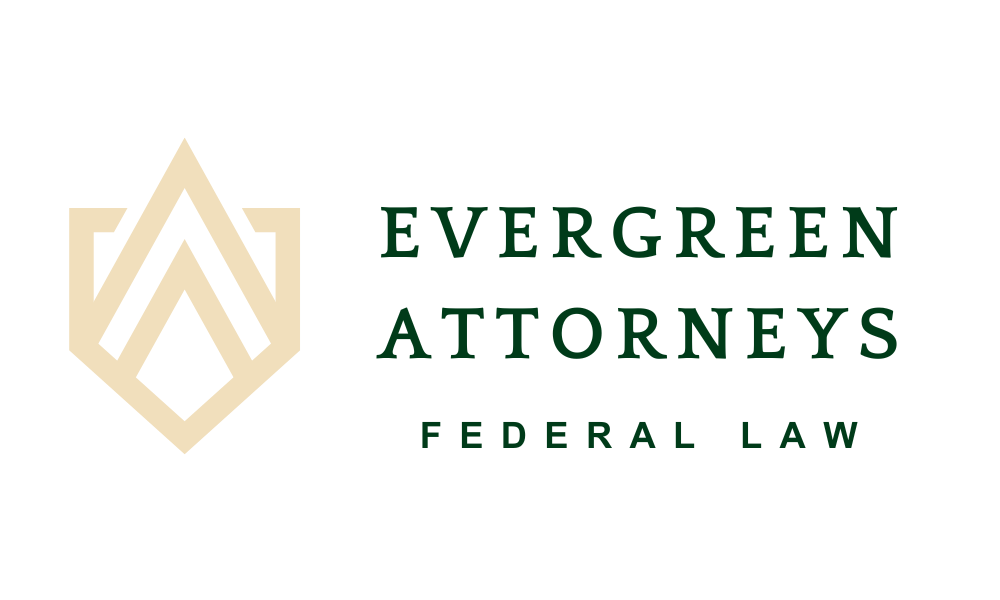Share
Share

Evergreen Attorneys are a boutique federal criminal defense law firm with headquarters in Colorado. Our federal criminal defense attorneys have been helping federal inmates seek presidential pardons, sentence commutations, and all forms of executive clemency for years. Learn more about President Trump’s Commutations and Pardons and how our office can help below.
January 2025 – Present
Since returning to office, President Donald J. Trump has resumed granting sentence reductions and official forgiveness for federal crimes (known as commutations and pardons), bringing attention to one of the most powerful forms of post-conviction relief in the justice system. Whether viewed as an act of mercy, a political statement, or a second chance for individuals facing the lasting consequences of a federal conviction, executive clemency can provide life-changing outcomes.
For those convicted of federal offenses (or their loved ones), understanding the clemency process is critical, especially as high-profile grants signal a renewed focus on presidential intervention in the criminal justice system. Before we break down the commutations and pardons issued by President Trump since 2025, the executive clemency power is explained in detail below. If you or someone you care about has a federal conviction, this guide will help you understand your options and how Evergreen Attorneys can help you apply for clemency with clarity and confidence.
Commutation vs. Pardon
Both commutations and pardons are types of executive clemency, which is defined by the Legal Information Institute as:
“…the general powers of the president and of governors to pardon, grant amnesty, commutation, or reprieve to individuals who have either been convicted of or may face the prospect of conviction for a criminal offense.”
Article II, Section 2, Clause 1 of the Constitution enumerates the President’s “Power to grant Reprieves and Pardons for Offenses against the United States, except in Cases of Impeachment.” Importantly, both commutations and pardons only apply to federal, not state, crimes. Information provided by the Office of the Pardon Attorney helps explain the difference between these two types of clemency below.
Commutation of Sentence
A sentence commutation lessens a punishment, either in whole or in part, that is currently being served. A commutation may also relieve an individual from any financial penalties assigned to their sentence, including fines or restitution; however, this remission is limited to monetary duties not yet paid.
While a commutation reduces a sentence, it does not suggest innocence, alter the existence of the conviction, or eliminate any civil disabilities imposed on the individual because of the criminal conviction. A civil disability results from the revocation of a legal right or privilege, such as the right to vote (disenfranchisement), the right to own firearms, or the privilege of holding a driver’s license. Notably, a person is still at risk of removal or deportation from the United States, even if they have received a commutation.
Pardon
A pardon is a demonstration of the President’s forgiveness of a convicted (or potentially convicted) criminal. Like a commutation, it does not imply one’s innocence, though it may be awarded to an individual who has acknowledged their responsibility for the offense and displayed a period of good conduct following the conviction or sentence completion. Unlike a commutation, however, a pardon lifts any civil disabilities that were originally prescribed and typically removes legal justifications for extracting or deporting someone from the U.S.
The Regulations Governing Executive Clemency: 28 C.F.R. §§ 0.35, 0.36, and 1.1 – 1.11
28 C.F.R., or Title 28 of the Code of Federal Regulations, is the comprehensive list of regulations of the Department of Justice. More specifically, 28 C.F.R. §§ 0.35, 0.36, and 1.1 – 1.11 describe the formal executive clemency process in accordance with these regulations.
- 0.35 General Functions; Delegation of Authority
Housed within the Department of Justice is the Office of the Pardon Attorney, who is empowered to execute the duties outlined in §§ 1.1 – 1.8, such as processing petitions, drafting opinions, and conducting investigations. The Pardon Attorney (PA) is supervised by the Attorney General (AG) and directed by the Deputy Attorney General (DAG), though the PA must adhere to the limitations outlined in § 0.36.
- 0.36 Recommendations
This section mandates that all clemency recommendations prepared by the PA must be submitted through the DAG, who uses their discretion in handling and forwarding them to the President.
- 1.1 Submission of Petition; Form to be Used; Contents of Petition
Anyone seeking clemency (e.g., pardon, commutation) must submit a formal petition addressed to the President via the PA’s office. Military-related offenses, however, must be submitted directly to the Secretary of the military department with original jurisdiction.
- 1.2 Eligibility for Filing Petition for Pardon
Answering the important question, “Who can apply for executive clemency?” this section explains that pardons typically cannot be requested until at least five years have passed since the completion of the sentence (including probation, parole, or supervised release).
- 1.3 Eligibility for Filing Petition for Commutation of Sentence
Generally, individuals may not request a commutation (or the waiver of a fine) if there are other judicial or administrative remedies still available, unless extraordinary circumstances can be demonstrated.
- 1.4 Offenses Against the Laws of Possessions or Territories of the United States
In other words, executive clemency petitions can only be submitted for U.S. federal crimes. If the crime was committed under the laws of a U.S. territory or possession (e.g., Puerto Rico or Guam), the petition should be sent to the local government or agency in charge.
- 1.5 Disclosure of Files
Documents related to a clemency petition (e.g., reports, memoranda, communications) are usually kept confidential and shared only with officials reviewing the petition. The AG, however, can choose to release them if required by law or if necessary to achieve justice.
- 1.6 Consideration of Petitions; Notifications of Victims; Recommendations to the President
When someone applies for executive clemency, the AG reviews the case by gathering information and possibly conducting an investigation with help from agencies like the FBI. If the crime had an identifiable victim, and the case is deemed severe enough, the AG may notify the victim that a clemency petition was filed and is invited to share any comments. If the victim would like to know the outcome of the petition, they must request updates through the Federal Bureau of Prisons. After everything is reviewed, the AG sends a written recommendation to the President, advising whether to approve or deny the clemency request.
- 1.7 Notifications of Grant of Clemency
If clemency is approved, the PA is responsible for notifying the applicant and preparing the formal clemency document (warrant) for the President to sign.
- 1.8 Notification of Denial of Clemency
On the other hand, if clemency is denied, or if 30 days have passed and no action has been taken by the President, the AG formally notifies the petitioner. The AG then closes the case after notification; clearly, the AG and PA work together, as the former supervises the latter. While the AG only formally informs the petitioner of denial, the PA notifies petitioners when the President has made a decision, regardless of grant or denial.
- 1.9 Delegation of Authority
This section simply permits the delegation of certain clemency responsibilities within §§ 1.1 – 1.8 by the PA to subordinate staff within the DOJ.
- 1.10 Procedures Applicable to Prisoners Under a Sentence of Death Imposed by a United States District Court
Special procedures for individuals under a federal death sentence are outlined within this section, detailing the proper handling, notifications, and opportunity for clemency review, alongside continued legal representation.
- 1.11 Advisory Nature of Regulations
This final section clarifies that these regulations are advisory and intended for internal DOJ use. They do not grant enforceable rights to petitioners, nor do they restrict the President’s constitutional executive clemency power under Article II, Section 2 of the Constitution. Now that we have finished explaining the legal basis for executive clemency, it’s time to investigate recent examples of this presidential power.
Pardons and Commutations Granted by President Trump
According to the DOJ, as of January 2025, President Trump has exercised his constitutional power to pardon 58 individuals and commute the sentences of 12 others. When including those who were convicted for their actions at the Capitol on January 6th, 2021, Trump has granted ~1,500 additional pardons and 14 more sentence commutations.
Below is a list of Trump’s second-term clemency grants:
January 20, 2025: ~1,500 Pardons, 14 Commutations
This sweeping exercise of executive clemency was directed at those who were involved in the January 6 events. Various charges were brought against these individuals, from trespassing to assaulting police to seditious conspiracy. Those listed below were accused of seditious conspiracy and had their sentences commuted to timed served:
- Jeremy Bertino
- Joseph Biggs
- Thomas Caldwell
- Joseph Hackett
- Kenneth Harrelson
- Kelly Meggs
- Roberto Minuta
- David Moerschel
- Ethan Nordean
- Dominic Pezzola
- Zachary Rehl
- Stewart Rhodes
- Edward Vallejo
- Jessica Watkins
The remaining cases of granted clemency will be listed in order of the recipient’s name, district, sentence, and offense.
January 21, 2025: 1 Pardon
- Ross William Ulbricht
- Southern District of New York
- Life imprisonment; lifetime supervised release (May 29, 2015)
- Aiding and abetting distribution of drugs over internet; continuing criminal enterprise; computer hacking conspiracy; fraud with identification documents; money laundering conspiracy
January 22, 2025: 2 Pardons
- Terence Dale Sutton, Jr.
- District of Columbia
- 66 months’ imprisonment; three years’ supervised release, conditioned upon 100 hours’ community service (September 12, 2024)
- Murder in second degree; conspiracy; obstruction of justice and aiding and abetting
- Andrew Zabavsky
- District of Columbia
- 48 months’ imprisonment; three years’ supervised release (September 12, 2024)
- Conspiracy; obstruction of justice and aiding and abetting
January 23, 2025: 24 Pardons
- Joan Bell
- District of Columbia
- 27 months’ imprisonment; 36 months’ supervised release, conditioned upon 100 hours’ community service (May 14, 2024)
- Conspiracy against rights; FACE Act
- Coleman Boyd
- Middle District of Tennessee
- Five years’ probation, conditioned upon six months’ home detention; $10,000 fine (as amended) (July 3, 2024)
- Conspiracy to obstruct access to a clinic providing reproductive health services; violation of the FACE Act
- Joel Curry
- Eastern District of Michigan
- N/A
- Conspiracy against rights; clinic access obstruction
- Jonathan Darnel
- District of Columbia
- 34 months’ imprisonment; 36 months’ supervised release, conditioned upon 100 hours’ community service (May 15, 2024)
- Conspiracy against rights; FACE Act
- Caroline Davis
- Middle District of Tennessee and Eastern District of Michigan
- Three years’ probation (April 24, 2024) and one year’s nonreporting probation (concurrent) (September 18, 2024)
- Offenses:
- Conspiracy to interfere with access to clinic entrances; aiding and abetting interference with access to clinic entrances
- Conspiracy; interference with clinic access
- Eva Edl
- Middle District of Tennessee and Eastern District of Michigan
- Three years’ probation (September 26, 2024) (vacated and dismissed) and N/A
- Offenses:
- Violation of the FACE Act
- Conspiracy against rights; clinic access obstruction
- Chester Gallagher
- Middle District of Tennessee and Eastern District of Michigan
- 16 months’ imprisonment; three years’ supervised release (September 26, 2024) and N/A
- Offenses:
- Conspiracy to obstruct access to a clinic providing reproductive health services; violation of the FACE Act
- Conspiracy against rights; clinic access obstruction
- Herb Geraghty
- District of Columbia
- 27 months’ imprisonment; 36 months’ supervised release (May 15, 2024)
- Conspiracy against rights; FACE Act
- William Goodman
- District of Columbia
- 27 months’ imprisonment; 36 months’ supervised release (May 14, 2024)
- Conspiracy against rights; FACE Act
- Dennis Green
- Middle District of Tennessee
- Time served; three years’ supervised release, conditioned upon six months’ home confinement (July 3, 2024)
- Conspiracy to obstruct access to a clinic providing reproductive health services; violation of the FACE Act
- Lauren Handy
- District of Columbia
- 57 months’ imprisonment; 36 months’ supervised release (May 14, 2024)
- Conspiracy against rights; FACE Act
- Paula Harlow
- District of Columbia
- 24 months’ imprisonment; 36 months’ supervised release (May 31, 2024)
- Conspiracy against rights; FACE Act
- John Hinshaw
- District of Columbia
- 21 months’ imprisonment; 36 months’ supervised release (May 14, 2024)
- Conspiracy against rights; FACE Act
- Heather Idoni
- Middle District of Tennessee, Eastern District of Michigan, and District of Columbia
- Sentences:
- 24 months’ imprisonment; 36 months’ supervised release (May 22,2024)
- N/A
- 24 months’ imprisonment; 36 months’ supervised release (May 22,2024)
- Offenses:
- Conspiracy against rights; FACE Act
- Conspiracy against rights; clinic access obstruction
- Conspiracy against rights; FACE Act
- Jean Marshall
- District of Columbia
- 24 months’ imprisonment; 36 months’ supervised release (May 15, 2024)
- Conspiracy against rights; FACE Act
- Christopher Moscinski
- Eastern District of New York
- Six months’ imprisonment; one year’s supervised release (June 27, 2023)
- Interference with freedom of access to reproductive health services
- Justin Phillips
- Eastern District of Michigan
- N/A
- Conspiracy against rights; clinic access obstruction
- Paul Place
- Middle District of Tennessee
- Three years’ probation (vacated and dismissed) (July 30, 2024)
- Violation of the FACE Act
- Jay Smith
- District of Columbia
- 10 months’ imprisonment; 36 months’ supervised release (August 7, 2023)
- FACE Act
- Paul Vaughn
- Middle District of Tennessee
- Time served; three years’ supervised release, conditioned upon six months’ home confinement (July 2, 2024)
- Conspiracy to obstruct access to a clinic providing reproductive health services; violation of the FACE Act
- Bevelyn Beatty Williams
- Southern District of New York
- 41 months’ imprisonment; two years’ supervised release (July 24, 2024)
- Violating FACE Act
- Calvin Zastrow
- Middle District of Tennessee and Eastern District of Michigan
- Six months’ imprisonment; three years’ supervised release, conditioned upon six months’ home confinement (July 3, 2024) and N/A
- Offenses:
- Conspiracy to obstruct access to a clinic providing reproductive health services; violation of the FACE Act
- Conspiracy against rights; clinic access obstruction
- Eva Zastrow
- Middle District of Tennessee, Eastern District of Michigan
- Three years’ probation (vacated and dismissed) (July 30, 2024) and N/A
- Offenses:
- Violation of the FACE Act
- Conspiracy against rights; clinic access obstruction
- James Zastrow
- Middle District of Tennessee
- Three years’ probation (July 30, 2024)
- Violation of the FACE Act
February 10, 2025: 1 Pardon
- Rod R. Blagojevich
- Northern District of Illinois
- 168 months’ imprisonment (as amended); 24 months’ supervised release; $20,000 fine (December 7, 2011)
- Wire fraud under color of official right (eight counts); conspiracy/attempted; attempt to commit extortion under color of official right; conspiracy to solicit and solicitation of bribe (three counts); making false statements
March 4, 2025: 1 Commutation
- Jean Pinkard
- Eastern District of Michigan
- One year and one day’s imprisonment; three years’ supervised release (May 8, 2024)
- Conspiracy to possess with intent to distribute and to distribute controlled substances
March 11, 2025: 1 Pardon
- Brian Kelsey
- Middle District of Tennessee
- 21 months’ imprisonment; three years’ supervised release (August 11, 2023)
- Conspiracy to defraud the United States; aiding and abetting the acceptance of excessive contributions
March 20, 2025: 1 Pardon
- Thomas Edward Caldwell
- District of Columbia
- Time served (January 10, 2025)
- Tampering with documents or proceedings
March 25, 2025: 1 Pardon
- Devon Archer
- Southern District of New York
- One year and one day’s imprisonment; one year’s supervised release; $43,427,436 restitution (February 28, 2022)
- Conspiracy to commit securities fraud; securities fraud
March 27, 2025: 6 Pardons
- Benjamin Delo
- Southern District of New York
- 30 months’ imprisonment (June 15, 2022)
- Violation of the Bank Secrecy Act
- Gregory Dwyer
- Southern District of New York
- One year’s probation; $150,000 fine (November 16, 2022)
- Violation of the Bank Secrecy Act
- Arthur Hayes
- Southern District of New York
- Two years’ probation, conditioned upon six months’ home confinement (May 20, 2022)
- Violation of the Bank Secrecy Act
- HDR Global Trading Limited
- Southern District of New York
- Two years’ unsupervised probation, $100,000,000 fine (January 15, 2025)
- Violation of the Bank Secrecy Act
- Trevor Milton
- Southern District of New York
- 48 months’ imprisonment; three years’ supervised release; (December 18, 2023)
- Securities fraud; wire fraud (two counts)
- Samuel Reed
- Southern District of New York
- 18 months’ probation (July 13, 2022)
- Violation of the Bank Secrecy Act
March 28, 2025: 3 Commutations
- Jason Galanis
- Southern District of New York
- Sentences:
- 135 months’ imprisonment; three years’ supervised release; $37,032,337.43 restitution (as amended June 5, 2017) (February 15, 2017)
- 173 months’ imprisonment, with 60 months consecutive; three years’ supervised release (concurrent); $47,785,176 restitution (August 11, 2017)
- Offenses:
- Conspiracy to commit securities fraud (two counts); securities fraud; investment adviser fraud
- Conspiracy to commit securities fraud; securities fraud; conspiracy to commit investment adviser fraud
- Ozy Media
- Eastern District of New York
- One year’s probation; $36,769,153.97 restitution (January 6, 2025)
- Conspiracy to commit securities fraud; conspiracy to commit wire fraud
- Carlos Roy Watson
- Eastern District of New York
- 116 months’ imprisonment; two years’ supervised release; $36,769,153.97 restitution (as amended January 6, 2025) (December 16, 2024)
- Conspiracy to commit securities fraud; conspiracy to commit wire fraud; aggravated identity theft
April 23, 2025: 2 Pardons
- Michele Fiore
- District of Nevada
- N/A
- Conspiracy to commit wire fraud; wire fraud (six counts)
- Paul Walczak
- Southern District of Florida
- 18 months’ imprisonment; two years’ supervised release; $4,381,265.76 restitution (April 11, 2025)
- Willful failure to pay trust fund taxes; failure to file return/information
May 27, 2025: 2 Pardons
- Scott Howard Jenkins
- Western District of Virginia
- 120 months’ imprisonment; three years’ supervised release; $600 fine (March 21, 2025)
- Conspiracy to commit bribery concerning programs receiving Federal funds, honest services mail fraud, and honest service wire fraud; honest services mail fraud; honest services wire fraud (three counts); bribery concerning programs receiving federal funds (seven counts)
- James Callahan
- District of Columbia
- N/A
- Filing false labor union reports
May 28, 2025: 16 Pardons, 6 Commutations
- Kevin Eric Baisden
- District of Columbia Superior Court
- Sentences:
- 90 days’ imprisonment (suspended); one years’ supervised release (September 20, 2010)
- Time served; one years’ supervised release; $50 fine (March 4, 2009)
- 180 days’ imprisonment (suspended); four months’ supervised release; $50 fine (February 5, 2007)
- 155 days’ imprisonment (100 days suspended); one years; supervised release; $50 fine (December 7, 2005)
- Offenses:
- Shoplifting
- Second degree theft
- Bail reform act
- Second degree theft
- Mark Bashaw
- Army
- No punishment (2022)
- Violation of lawful orders
- Julie Chrisley
- Northern Georgia
- 84 months’ imprisonment; three years’ supervised release; $4,740,645.04 restitution (November 21, 2022; as amended September 25, 2024)
- Conspiracy to commit bank fraud; bank fraud (five counts); wire fraud; conspiracy to defraud the U.S. to obstruct and impede the Internal Revenue Laws; tax evasion; obstruction of justice
- Todd Chrisley
- Northern Georgia
- 50 years’ imprisonment; three years’ supervised release; $87,533,863.46 restitution (September 16, 2011)
- Conspiracy to commit bank fraud; bank fraud (five counts); conspiracy to defraud the U.S. to obstruct and impede the Internal Revenue Laws; tax evasion
- Lawrence S. Duran
- Southern District of Florida
- 50 years’ imprisonment; three years’ supervised release; $87,533,863.46 restitution (September 16, 2011)
- Conspiracy to commit health care fraud; health care fraud (11 counts); conspiracy to defraud the United States and to receive and pay health care kickbacks; conspiracy to commit money laundering; money laundering (18 counts); structuring to avoid reporting requirements (six counts)
- Kentrell D. Gaulden
- Utah
- 23 months’ imprisonment; no supervised release (December 10, 2024)
- Felon in possession of a firearm
- Michael Gerard Grimm
- Eastern New York
- Eight months’ imprisonment; one year’s supervised release, conditioned upon 200 hours’ community service; $148,907.11 restitution (July 17, 2015; as amended August 10, 2015)
- Aiding and assisting in the preparation of false and fraudulent tax returns
- Michael Ray Harris
- Central District of California
- 235 months’ imprisonment (commuted to expire on January 19, 2021); five years’ supervised release; $80,000 fine (November 26, 1990)
- Conspiracy to possess with intent to distribute and to aid and abet possession and distribution of cocaine; aiding and abetting possession with intent to distribute cocaine; possession with intent to distribute cocaine
- Larry Hoover
- Northern District of Illinois
- Life imprisonment; five years’ supervised release (June 18, 1998)
- Narcotics conspiracy; continuing criminal enterprise; use of persons under age 18; distribution of cocaine; use of a communication facility in committing the narcotics conspiracy; distribution of cocaine (two counts) use of a firearm in the commission of a drug trafficking crime
- James M. Kernan
- Northern District of New York
- Five years’ probation, conditioned upon 400 hours’ community service; $250,000 fine (January 25, 2010)
- Knowingly and willfully permitting a convicted felon to be engaged in the business of insurance
- Marlene Mary Kernan
- Northern District of New York
- Two years’ probation; $182,708 fine (January 25, 2010)
- Permitting a convicted felon to engage in the business of insurance
- Tanner J. Mansell
- Southern Florida
- One year’s probation, conditioned upon 50 hours’ community service; $3,343.72 restitution (February 13, 2023)
- Theft of property within special maritime jurisdiction
- John R. Moore, Jr.
- Southern Florida
- One year’s probation, conditioned upon 50 hours’ community service; $1,000 fine; $3,343.72 restitution (February 13, 2023)
- Theft of property within special maritime jurisdiction
- Marian I. Morgan
- Middle District of Florida
- 405 months’ imprisonment; three years’ supervised release; $19,958,995 restitution (April 27, 2012)
- Conspiracy to defraud the United States; wire fraud (7 counts); transfer of funds taken by fraud (5 counts); money laundering (6 counts); making false statements on income tax returns (3 counts)
- John G. Rowland
- Connecticut
- Sentences:
- 12 months and one day’s imprisonment; three years’ supervised release, conditioned upon four months’ home confinement and 300 hours’ community service; $82,000 fine (March 18, 2005)
- 30 months’ imprisonment; three years’ supervised release $35,000 fine (March 18, 2015)
- Offenses:
- Conspiracy to defraud the United States
- Falsification of records in a federal investigation; conspiracy; causing false statements (two counts); illegal campaign contributions (two counts)
- Charles Overton Scott
- Northern District of Ohio
- 42 months’ imprisonment; two years’ supervised release; $5,000 fine; $500,000 restitution (February 12, 2025)
- Conspiracy to commit securities fraud; securities fraud
- Alexander Sittenfeld
- Southern Ohio
- 16 months’ imprisonment; one year’s supervised release; $40,000 fine (October 10, 2023)
- Bribery concerning programs receiving federal funds; attempted extortion under color of official right
- Earl Lamont Smith
- Northern District of Georgia
- 18 months’ imprisonment; three years’ supervised release; $163,330 restitution (March 24, 2010)
- Theft of government property
- Garnett Gilbert Smith
- District of Maryland
- 300 months’ imprisonment; five years’ supervised release (January 30, 2014)
- Conspiracy to distribute and possess with intent to distribute cocaine
- Charles Lavar Tanner
- Northern District of Indiana
- 360 months’ imprisonment (as amended) (commuted to expire on October 21, 2020); 10 years’ supervised release; $1,000 fine (May 26, 2009)
- Conspiracy to possess with intent to distribute five kilograms or more of cocaine; attempt to possess with intent to distribute five kilograms or more of cocaine
- Anabel Valenzuela
- Hawaii
- 384 months’ imprisonment; five years’ supervised release (January 5, 2009)
- Conspiracy to distribute and possess with intent to distribute 50 grams or more of methamphetamine; conspiracy to commit money laundering; criminal forfeiture (two counts)
- Imaad Shah Zuberi
- Central California
- 144 months’ imprisonment; three years’ supervised release; $1,750,000 fine; $15,705,080.11 restitution (February 18, 2021)
- Violations of the Foreign Agents Registration Act; tax evasion; foreign, conduit, and other illegal campaign contributions; tampering with a witness, victim or informant (obstruction of justice)
May 29, 2025: 1 Pardon, 2 Commutations
- Jeremy Young Hutchinson
- Eastern Arkansas and Western Missouri
- Sentences:
- 18 months’ imprisonment; three years’ supervised release; $224,497.10 restitution (February 3, 2023)
- 28 months’ imprisonment (consecutive); three years’ supervised release (concurrent); $131,038 restitution (February 3, 2023)
- 50 months’ imprisonment (consecutive); three years’ supervised release (April 23, 2023)
- Offenses:
- Conspiracy to commit bribery
- Aiding and abetting filing of false income tax return
- Conspiracy; criminal forfeiture of property
- Edward Ruben Sotelo
- Northern Texas
- Life imprisonment; five years’ supervised release; $50,000 fine (August 17, 1995)
- Conspiracy; continuing criminal enterprise; possession with intent to distribute 1 kilogram of cocaine, aiding and abetting (two counts); use of telephone to facilitate commission of a felony (three counts); possession with intent to distribute 10 pounds of marijuana, and aiding and abetting; distribution of more than five kilograms of cocaine and aiding and abetting
- Joe Angelo Sotelo
- Northern District of Texas
- Life imprisonment; five years’ supervised release (August 17, 1995)
- Conspiracy; possession with intent to distribute one kilogram of cocaine and aiding and abetting
How Can Evergreen Attorneys Help Me Apply for Clemency?
If you or a loved one has been convicted of a federal crime, a presidential pardon or commutation may offer a powerful path forward. This process, however, is complex, competitive, and highly discretionary. As federal criminal defense lawyers focusing solely on federal cases, our team at Evergreen Attorneys is ready to help you achieve post-conviction relief.
We understand the legal, strategic, and personal factors involved in a compelling clemency petition. Whether you’re considering applying or want to explore your eligibility, we can guide you through every step. Contact us today to discuss how we can help you pursue a second chance. The experience and hope of the federal criminal defense lawyer team at Evergreen Attorneys is only a click away.
Zachary Newland
Zachary Newland is an attorney, author, aspiring BBQ connoisseur, and mediocre skier. Zachary's law practice is focused on federal criminal defense, federal appellate advocacy including post-conviction remedies, civil rights litigation, and complex trial work. Zach lives in Evergreen, Colorado with his family. You can reach Zach at [email protected] to discuss your case or call him directly at 303-948-1489.
STAY IN THE LOOP
Subscribe to our free newsletter.
The OIG’s Audit of the [...]




